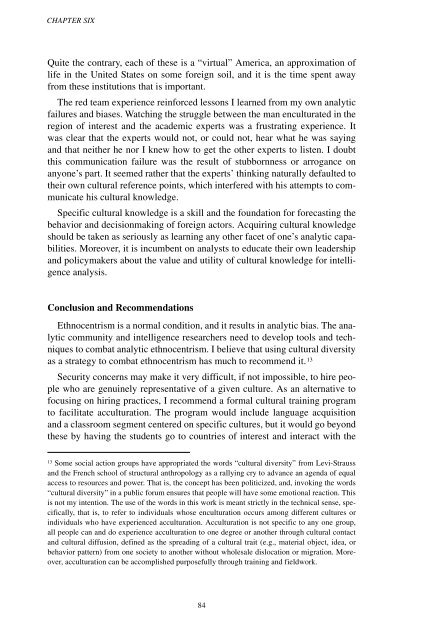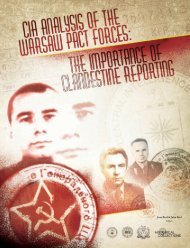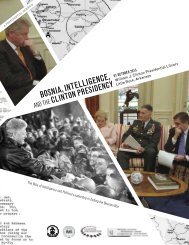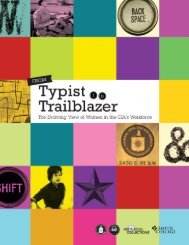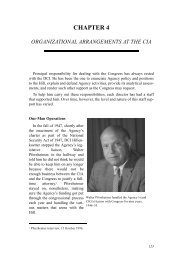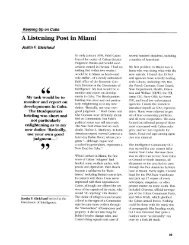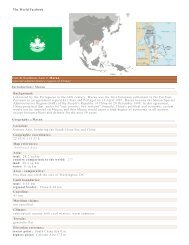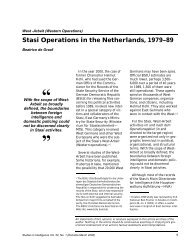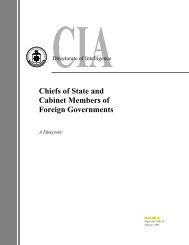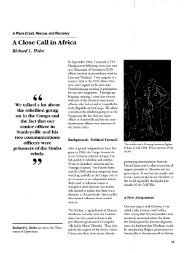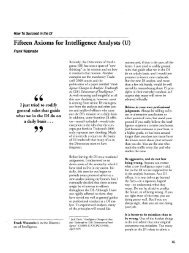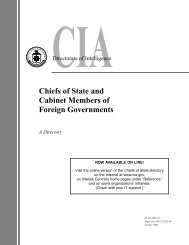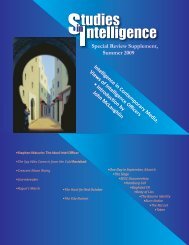Analytic Culture in the U.S. Intelligence Community (PDF) - CIA
Analytic Culture in the U.S. Intelligence Community (PDF) - CIA
Analytic Culture in the U.S. Intelligence Community (PDF) - CIA
Create successful ePaper yourself
Turn your PDF publications into a flip-book with our unique Google optimized e-Paper software.
CHAPTER SIX<br />
Quite <strong>the</strong> contrary, each of <strong>the</strong>se is a “virtual” America, an approximation of<br />
life <strong>in</strong> <strong>the</strong> United States on some foreign soil, and it is <strong>the</strong> time spent away<br />
from <strong>the</strong>se <strong>in</strong>stitutions that is important.<br />
The red team experience re<strong>in</strong>forced lessons I learned from my own analytic<br />
failures and biases. Watch<strong>in</strong>g <strong>the</strong> struggle between <strong>the</strong> man enculturated <strong>in</strong> <strong>the</strong><br />
region of <strong>in</strong>terest and <strong>the</strong> academic experts was a frustrat<strong>in</strong>g experience. It<br />
was clear that <strong>the</strong> experts would not, or could not, hear what he was say<strong>in</strong>g<br />
and that nei<strong>the</strong>r he nor I knew how to get <strong>the</strong> o<strong>the</strong>r experts to listen. I doubt<br />
this communication failure was <strong>the</strong> result of stubbornness or arrogance on<br />
anyone’s part. It seemed ra<strong>the</strong>r that <strong>the</strong> experts’ th<strong>in</strong>k<strong>in</strong>g naturally defaulted to<br />
<strong>the</strong>ir own cultural reference po<strong>in</strong>ts, which <strong>in</strong>terfered with his attempts to communicate<br />
his cultural knowledge.<br />
Specific cultural knowledge is a skill and <strong>the</strong> foundation for forecast<strong>in</strong>g <strong>the</strong><br />
behavior and decisionmak<strong>in</strong>g of foreign actors. Acquir<strong>in</strong>g cultural knowledge<br />
should be taken as seriously as learn<strong>in</strong>g any o<strong>the</strong>r facet of one’s analytic capabilities.<br />
Moreover, it is <strong>in</strong>cumbent on analysts to educate <strong>the</strong>ir own leadership<br />
and policymakers about <strong>the</strong> value and utility of cultural knowledge for <strong>in</strong>telligence<br />
analysis.<br />
Conclusion and Recommendations<br />
Ethnocentrism is a normal condition, and it results <strong>in</strong> analytic bias. The analytic<br />
community and <strong>in</strong>telligence researchers need to develop tools and techniques<br />
to combat analytic ethnocentrism. I believe that us<strong>in</strong>g cultural diversity<br />
as a strategy to combat ethnocentrism has much to recommend it. 13<br />
Security concerns may make it very difficult, if not impossible, to hire people<br />
who are genu<strong>in</strong>ely representative of a given culture. As an alternative to<br />
focus<strong>in</strong>g on hir<strong>in</strong>g practices, I recommend a formal cultural tra<strong>in</strong><strong>in</strong>g program<br />
to facilitate acculturation. The program would <strong>in</strong>clude language acquisition<br />
and a classroom segment centered on specific cultures, but it would go beyond<br />
<strong>the</strong>se by hav<strong>in</strong>g <strong>the</strong> students go to countries of <strong>in</strong>terest and <strong>in</strong>teract with <strong>the</strong><br />
13<br />
Some social action groups have appropriated <strong>the</strong> words “cultural diversity” from Levi-Strauss<br />
and <strong>the</strong> French school of structural anthropology as a rally<strong>in</strong>g cry to advance an agenda of equal<br />
access to resources and power. That is, <strong>the</strong> concept has been politicized, and, <strong>in</strong>vok<strong>in</strong>g <strong>the</strong> words<br />
“cultural diversity” <strong>in</strong> a public forum ensures that people will have some emotional reaction. This<br />
is not my <strong>in</strong>tention. The use of <strong>the</strong> words <strong>in</strong> this work is meant strictly <strong>in</strong> <strong>the</strong> technical sense, specifically,<br />
that is, to refer to <strong>in</strong>dividuals whose enculturation occurs among different cultures or<br />
<strong>in</strong>dividuals who have experienced acculturation. Acculturation is not specific to any one group,<br />
all people can and do experience acculturation to one degree or ano<strong>the</strong>r through cultural contact<br />
and cultural diffusion, def<strong>in</strong>ed as <strong>the</strong> spread<strong>in</strong>g of a cultural trait (e.g., material object, idea, or<br />
behavior pattern) from one society to ano<strong>the</strong>r without wholesale dislocation or migration. Moreover,<br />
acculturation can be accomplished purposefully through tra<strong>in</strong><strong>in</strong>g and fieldwork.<br />
84


